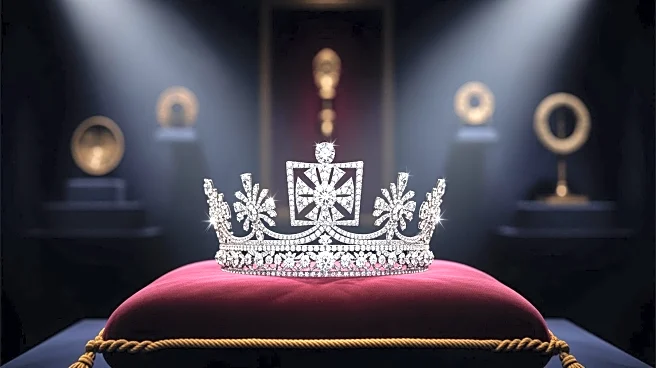What's Happening?
French police are actively investigating the theft of crown jewels from the Louvre, which has sparked a broader discussion about the colonial origins of these artifacts. The jewels, while crafted in France, contain gems sourced from former colonies such
as Sri Lanka, India, Brazil, and Colombia. This incident has intensified calls for the Louvre and other European museums to provide more transparency regarding the provenance of their collections. Experts suggest that the theft could lead to a wider reckoning over the restitution of artifacts acquired during colonial times. The investigation is ongoing, with concerns that the stolen jewels might be broken down or melted due to their fame, making them difficult to sell intact.
Why It's Important?
The theft of the Louvre's crown jewels highlights the complex history of colonialism and its impact on museum collections. This event has the potential to influence public policy and museum practices regarding the transparency and restitution of artifacts with colonial origins. It raises ethical questions about the acquisition and display of such items, prompting museums to reconsider how they present their collections. The incident could lead to increased pressure on institutions to address the colonial histories of their artifacts, potentially resulting in policy changes and restitution efforts. Stakeholders such as historians, museum curators, and governments may need to navigate the delicate balance between preserving history and acknowledging past injustices.
What's Next?
The ongoing investigation into the theft may lead to further scrutiny of the Louvre's practices and those of other museums with similar collections. As the debate over colonial-era artifacts continues, museums might face increased demands for transparency and restitution. This could involve legislative changes or special exceptions to existing laws that currently restrict the removal of state-held objects. The incident may also prompt museums to adopt more comprehensive labeling and storytelling practices that acknowledge the complex histories of their collections. Additionally, international discussions on restitution, similar to those surrounding the Koh-i-Noor diamond, may gain momentum, influencing how museums handle artifacts with contested origins.
Beyond the Headlines
The theft of the Louvre's jewels underscores the broader ethical and cultural implications of colonial-era acquisitions. It challenges museums to confront uncomfortable histories and engage with origin communities in a meaningful way. This could lead to a shift in how museums curate and present their collections, emphasizing shared authorship and transparency. The incident may also inspire a reevaluation of the legal frameworks governing artifact restitution, potentially leading to more inclusive and equitable practices. As museums grapple with these issues, they may need to balance the preservation of cultural heritage with the acknowledgment of historical injustices.
















